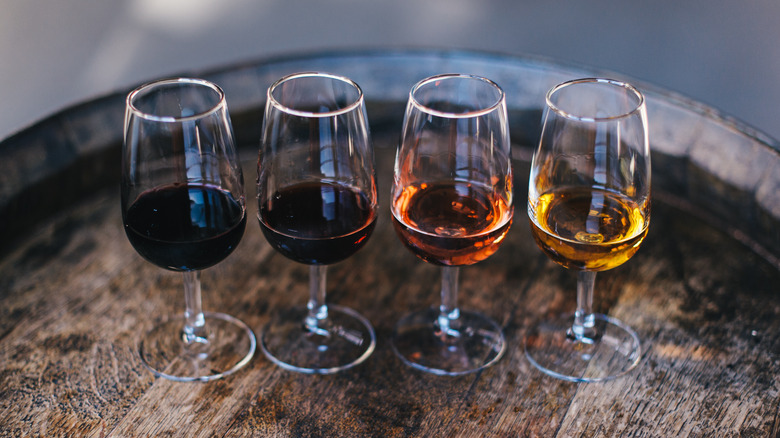The Long Journey That Contributed To The Accidental Invention Of Port
Port wines can be aged for years and even decades, resulting in flavors composed of complex fruity notes, buttery elements, and sweet caramel essences — perfect to pair with unique cheeses and decadent desserts, per MasterClass. Though most known as a punctuation mark to end delicious meals, port wine also has the versatility to be served as an apertif when mixed with tonic or used as a component in cocktails.
The fortified wines are traditionally separated into four categories — red, tawny, white, and rosé — but the most common varieties fall into the divisions of dryer, chocolatey reds or caramel tawny ports (via Wine Folly). And while Portugal is credited with the origins of this sweet wine, we also have enterprising merchants to credit for the drink's popularity.
When Britain banned wines from France due to ongoing wars between the two nations, Portuguese vintages rose to the forefront as a replacement, paving the way for the eventual creation of port (via Rick Steves' Europe).
Ready for the long haul
As English consumers developed a taste for wines from the Iberian country, Winerist Magazine explains merchants set out looking for the best-tasting blends, traveling to vineyards in more remote areas and sampling different varieties. The only problem was that these wines had a greater distance to travel to get back to England.
When there's a will, there's a way, especially when alcohol is involved. As Rick Steves' Europe claims, two determined British brothers ingeniously mixed Portuguese wine with brandy to help preserve it during their long journey, essentially fortifying it and extending its shelf life. The concoction took on the oakiness of the added ingredient, becoming a surprise hit when the siblings reached home.
To this day, port is still a wine fortified with brandy or grape spirits after the beginning of fermentation. This addition kills yeast, resulting in a sweeter, boozier taste (via Wine Tourism). It's no wonder that the aging period for vintage port can go up to four decades — this is an alcohol that has been made for the long haul.

